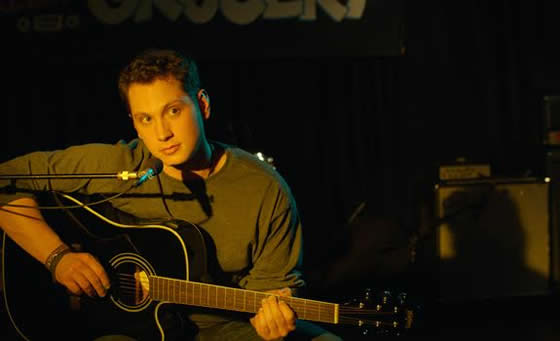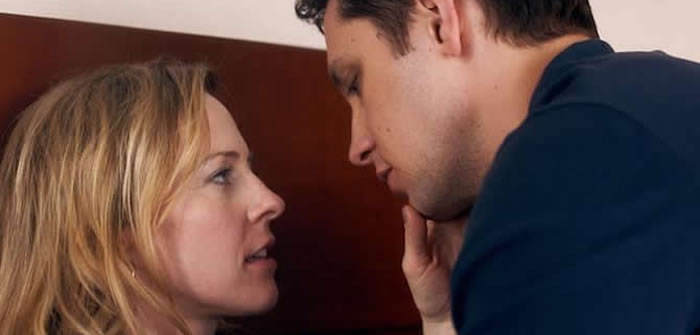Not all stories have a bad guy. Not every relationship is lucky enough to have a clear antagonist to stand against and in ‘How He Fell In Love’ it confronts the audience with exactly that. It is within these tales that we come closer to understanding our human experience; they reflect back to us the reality that most struggles come from within—it’s our self and our emotions we’re looking to control.
“How He Fell In Love’ starts on Travis after he watches a former flame tie the knot in upstate New York. He ends up sharing a car back to the city with another lonely heart, Ellen, which leads to them becoming romantically entwined. In the coming weeks, what seemed to be a passing fling turns into a deep connection neither had expected; the only problem, Ellen is married. ‘How He Fell In Love’ examines the tumultuous and sexy dynamic of having affair, without allowing itself to lean on convention.
Cinema Without Borders sat down with the director of ‘How He Fell In Love’ Marc Meyers to give us more insight into his process of realizing the film and what he was hoping to achieve through it. ‘How He Fell In Love’ is in theaters now.
Wyatt Phillips: Tell me about the inspiration to tell the story of HOW HE FELL IN LOVE?
Marc Meyers: Well, it started with the opening scene in the movie, it was originally a one act play that I had written, and then I reached back, into like my folders, and I thought oh this might be a fun way to start a movie. From that wedding scene, I started to sort of figure out where this main male character would travel and I wanted to sort of have some fun exploring various aspects of love and relationships and I thought an extra marital affair would be a fun provocative sexy cinematically, y’know, friendly place to go and so that was sort of how the whole thing originated, was to sort of explore, to explore that – and I honestly also just wanted to also make a movie that I felt would have some sexiness to it and have some characters squirrel away into hotel rooms where they could open up and have real conversations and feel like the moral or the world is not going to sort of get in the way.
WP: I felt like this movie is definitely in the vein of, I mean not as extreme as ‘Last Tango in Paris’ but it has that sort of meeting of the anima/animus, the connecting of the inner self, so to speak. Could you site some movies that informed the way you envisioned this film?
MM: Well, ‘Last Tango In Paris’ and the idea of it, yes – I didn’t actually re-watch it until I got closer to filming and this one scene in the movie, where I look at how he had cut between the two characters intimately alone and was like, ‘oh, that’s a really nice frame on Brando, I’ll do the same thing with Matt MaGorry, lighting on his back,’ and you know that was definitely in the moment. I looked at ‘Scenes From A Marriage’ and how the camera moved around and some of those bedroom scenes and those sort of marital scenarios—scenarios in my film were referencing that, there’s a movie by Olivier Assayas called ‘Late August, Early September’ that I adore that introduced me to his films and I really like how he used music and just the way that the camera floated between characters sometimes and it wasn’t really about coverage, but just trying to find an energy that captured these actors moving through a space or down a sidewalk.
 WP: What did you do to collaborate with the Actors to help them find this inspiration you’d been working from?
WP: What did you do to collaborate with the Actors to help them find this inspiration you’d been working from?
MM: The script kind of, we all, I don’t treat my script like it’s the bible, it’s just a jumping off point, but fortunately there’s very few moments when the actors have a problem with what’s written, so we really kind of figure out what I might be thinking. I also try to not have the behavior be very on the nose about what they’re doing or saying, and giving the actors room to act and in anticipation of that I don’t always want to dialogue to be talking in such truths or such obvious ways, and knowing if I have enough things brewing underneath the surface that the actors when they step into it are going to rediscover the real tensions and layer it on this dialogue that could be banter but it’s either a personal exchange or something in their life. Giving the actors room to act and then part of directing I think, once in a while, most in the mixing room at that point in the process, but also working with the actors on set you’re almost like a goalie. You’re trying to keep the things that don’t feel authentic away. And so, if it sort of makes sense to you and you believe it, and the director, I know, has almost like a front row seat to the performance, and if it’s just, if I kind of believe it then I don’t stop it, but if it doesn’t work or feels on the nose that stuff I just kind of try to find a way to bring it back.
WP: Expand on that, do you bring this approach of nothing is final to more than just your collaboration with the actors?
MM: Well, even though it’s naturalistic, it’s not like an action or anything, I do storyboard the whole thing out, so I have that to look at. It’s a way to control the creative process in way that we can gather around it and understand it by me pre thinking how the camera moves through the space then other people can contribute to that idea, but if I’m trying to figure it out in the room, I think people are just waiting on me then we may not score a further way to move the camera or for the behavior to go in an unanticipated ways because there are a lot of sex scenes and intimate moments, I, in advance of filming, created a binder that I carried with me which was not only the script but had a mood section with lots of photography in it, especially the sort of sexy, for the sexy scenes and we can get a lot of that sexy photography off of Tumblr, this beautiful, semi-erotic photography, and I could point to those and say to the actors and the cinematographer, I feel like we should frame the widest of these shots in this moment like this shot, and it gave comfort to the actors to know, ‘oh, I see what you’re going for,’ and from there we sort of figured it out.
WP: Is there anything you wanted this film to leave the audience with?
MM: I try not to make, I don’t really want to make a point, you know? I don’t really have an agenda, I wanted to explore the different facets and forces that make these various characters fall in love with each other and through the circumstances getting more and more complicated for the sake of drama, just that you emotionally get invested in them as well and that helps you maybe feel life with maybe a little more understanding or empathy. The colorist, when we were coloring the movie, said something that I took for granted, and he goes, ‘this movie doesn’t even have a bad guy,’ he was saying how much he like the husband, he wasn’t like an asshole. I feel like conflict is not necessarily always coming from a bad guy, it’s just the conflict from situations and so I felt like they were all sort of good people, but the issue at hand was conflicting. One thing I did believe in, about the point of this, I didn’t… I didn’t want to hold blame as part of the point of the movie, and I believe that this experience they all went through made them all better people in their separate lives. So, though the audience may not know how they’re all going to end up, I hope that people agree that this experience for them made them stronger, more evolved people, through the process of this sexy, tumultuous moment in their lives.
‘How He Fell In Love’ is in theatres now, check your local listing to find a show time near you.

